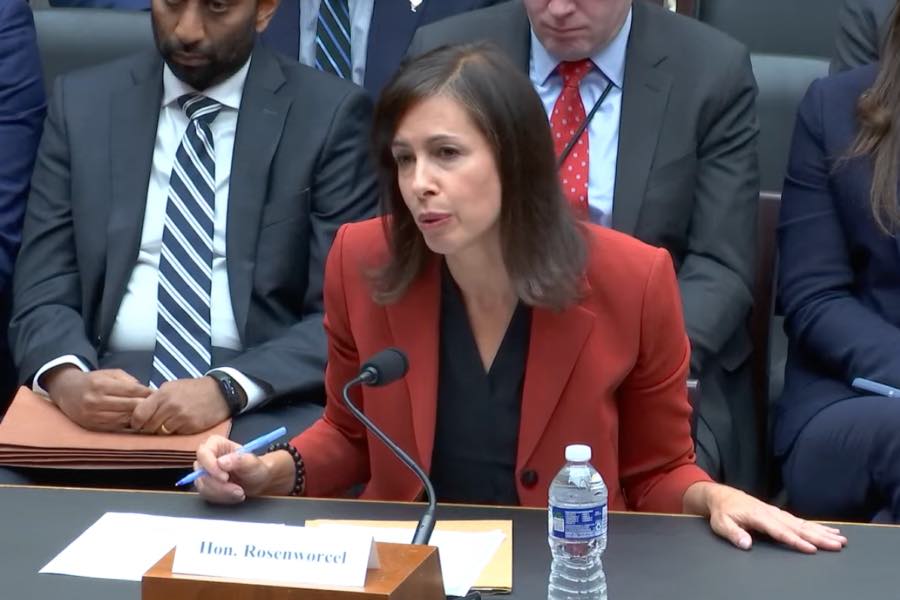
FCC Chairwoman Jessica Rosenworcel this week told members of the House subcommittee on communications and technology that she would like FCC commissioners to establish new rules for the 4.9 GHz spectrum band “within the next several months” but noted the flurry of recent filings in the proceeding.
Rosenworcel (pictured above, from a previous hearing) provided the estimate for a decision in response to a question from Rep. Kat Cammack (R-Fla.), who asked for a timeline for the FCC to decide “whether this band will be reallocated to FirstNet or will be auctioned.” Rosenworcel said the scenarios mentioned by Cammack did not encompass all options the FCC could choose in the matter.
“We have an open docket on that. We’re taking in comment from all kinds of public-safety authorities right now,” Rosenworcel said during a subcommittee hearing conducted on Tuesday. “To be clear, it is not a question of whether it will go to FirstNet or be auctioned. It’s a question of what public-safety authorities might be managing these airwaves going forward.”
When Cammack pressed for a timeline for a 4.9 GHz decision, Rosenworcel said, “My hope is that we can do this within the next several months.”
However, Rosenworcel also noted a key challenge in the FCC reaching a decision in the controversial docket.
“Lots of people are filing a lot of stuff before us, and—when it comes at us fast and furious—we have to spend some time looking at it and reading it carefully,” she said.
The FCC is conducting this proceeding in an effort to establish new 4.9 GHz rules that will be designed to address commissioners’ bipartisan perceptions that the 50 MHz public-safety spectrum band has been underutilized during the past 20 years.
Indeed, the proceeding’s official reply-comment period ended on May 15, but the FCC has received more than 30 ex parte filings during the past eight weeks. This includes a filing from AT&T, the carrier giant contracted to build and maintain the FirstNet Authority’s nationwide public-safety broadband network (NPSBN).
Such filings have continued this week, with the Coalition for Emergency Response and Critical Infrastructure (CERCI) reiterating its opposition to the Public Safety Spectrum Alliance (PSSA) proposal that the FCC directly or indirectly grant a nationwide 4.9 GHz spectrum license to the FirstNet Authority. CERCI and organization member Verizon have described such an arrangement as a spectrum “windfall” for AT&T, based on an assumption that AT&T would gain access to the 4.9 GHz band via its contract with the FirstNet Authority.
In addition, CERCI’s latest filing states that the AT&T filing does not adequately address legal questions associated with the matter. CERCI repeatedly has asserted that current law does not authorize the FCC to approve a 4.9 GHz spectrum license to the FirstNet Authority—a federal-government entity—and does not allow the FirstNet Authority to accept a license to airwaves outside of the 700 MHz Band 14 spectrum allocated by Congress in 2012.
AT&T disputed this position in its filing, but CERCI’s filing this week claims those arguments are not convincing.
“AT&T has done nothing to solve the statutory, constitutional, and policy problems with PSSA’s proposal to hand over the 4.9 GHz band to FNA,” the CERCI filing states. “Instead, AT&T breaks its silence only to shy away from committing to any particular approach, noting vaguely and repeatedly that a “variety of approaches,” or a “variety of pathways,” or a “variety of means” perhaps could work.
“But PSSA and AT&T have not identified any constitutional and legal means to achieve their desired policy ends, likely because such means do not in fact exist. The Commission should therefore decline to grant FNA access to the 4.9 GHz band.”
AT&T’s filing expressed support for an indirect license to the FirstNet Authority, with the FCC granting a nationwide 4.9 GHz license to a band manager that would be required to reach a spectrum-sharing agreement with the FirstNet Authority. But the CERCI filing contends that such an approach by the FCC would not be appropriate.
“A Band Manager that does not use its licensed spectrum serves one purpose: assignment of that spectrum to others, based on a set of neutral and objective criteria,” the CERCI filing states. “PSSA’s proposal, however, would have the Commission assign allocation functions it does not have to a middleman with instructions to assign all of the licensed spectrum to a single, prejudged winner.
“Under PSSA’s proposal, the Band Manager’s sole purpose is to end-run the Communications Act’s division of authority between the FCC and the NTIA, deputizing the Band Manager less as a spectrum broker than a spectrum launderer.”
